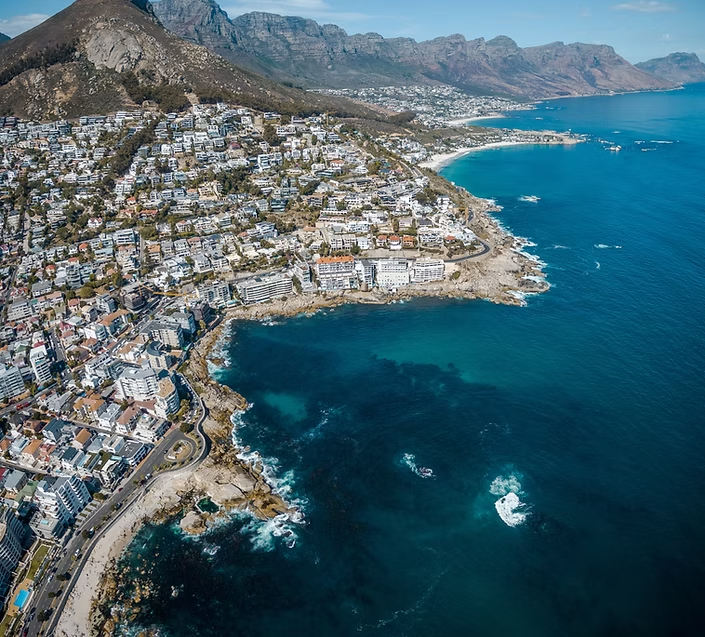
Explore Cape Town: Guide to Top Attractions & Travel Tips
Explore Cape Town
Cape Town
Cape Town, South Africa: Where Nature and Culture Collide
Cape Town, known as the "Mother City," is one of the most breathtaking destinations in the world. With the iconic Table Mountain, stunning coastlines, and a rich cultural history, this South African gem offers a mix of adventure, relaxation, and vibrant city life. Whether you're exploring the Cape Winelands, spotting penguins at Boulders Beach, or taking a scenic drive along Chapman’s Peak, Cape Town is a must-visit for travelers seeking both beauty and excitement.
Frequently Asked Questions: Cape Town
- December to February (Summer): Peak tourist season with warm weather, lively beaches, and outdoor festivals.
- March to May (Autumn): Milder weather, fewer crowds, and excellent wine-tasting experiences in the Cape Winelands.
- June to August (Winter): Cooler temperatures with occasional rain, but great for whale watching along the coast.
- September to November (Spring): Pleasant weather, fewer tourists, and stunning wildflower blooms in nearby regions.
- Table Mountain – Take a cable car or hike to the top for panoramic city views.
- Cape of Good Hope & Cape Point – A scenic spot where the Atlantic and Indian Oceans meet.
- Boulders Beach – Home to the famous colony of African penguins.
- V&A Waterfront – A lively area with restaurants, shopping, and entertainment.
- Robben Island – A historic site where Nelson Mandela was imprisoned.
- Chapman’s Peak Drive – One of the most scenic coastal drives in the world.
- Kirstenbosch National Botanical Garden – A lush garden with incredible views and diverse plant life.
- Bo-Kaap – A colorful neighborhood known for its rich Malay culture and history.
- Bobotie – A spiced minced meat dish baked with an egg-based topping.
- Bunny Chow – A hollowed-out loaf of bread filled with curry.
- Boerewors – A traditional South African sausage, often grilled.
- Gatsby – A giant sandwich stuffed with fries, meat, and sauce.
- Cape Malay Curry – A fragrant, mildly spicy curry with unique local flavors.
- Biltong & Droëwors – Dried, cured meat snacks similar to jerky.
- Koeksisters – A sweet, syrupy fried dough treat.
- Fresh seafood – Try kingklip, snoek, or calamari at the city’s top seafood restaurants.
- Ridesharing: Uber and Bolt are the safest and most convenient options for tourists.
- MyCiTi Bus: Cape Town’s public bus system is affordable and reliable for getting around the city.
- Car Rental: Recommended if you plan to explore areas outside the city, such as the Cape Winelands or Cape Point.
- Taxis: Not recommended as they are often unmetered and expensive.
- Walking: Many areas like the V&A Waterfront and Camps Bay are pedestrian-friendly.
- Visa-free entry for up to 90 days for travelers from the U.S., Canada, U.K., EU, and many other countries.
- Your passport must be valid for at least six months beyond your travel dates.
- Travelers with children under 18 may need to provide an unabridged birth certificate (strictly enforced in some cases).
- Yellow fever vaccination is required if arriving from a country with yellow fever risk.
- The local currency is the South African Rand (ZAR).
- It’s recommended to bring some USD, EUR, or GBP to exchange at banks or forex bureaus.
- ATMs are widely available and offer competitive exchange rates.
- Credit cards are widely accepted, but cash is useful for small markets and tipping.
- South Africa has 11 official languages, but English is widely spoken in Cape Town, especially in tourist areas.
- Afrikaans and Xhosa are also commonly spoken, but you won’t need a translator for basic interactions.
- Tipping is expected in restaurants, hotels, and for services.
- Casual dress is common, but upscale restaurants and bars may require a smarter dress code.
- Safety tip: Avoid displaying valuables and be cautious when walking in unfamiliar areas at night.
- Greetings are important; a handshake and friendly conversation are customary.
- Respect nature: Cape Town is known for its natural beauty, so follow conservation rules when hiking or visiting national parks.
- Restaurants: 10-15% if service charge is not included.
- Hotel staff:
- Porters: 10-20 ZAR per bag
- Housekeeping: 20-50 ZAR per stay
- Tour guides: 50-100 ZAR per person, depending on service.
- Taxi & Rideshare Drivers: Round up the fare or tip a small amount.
- For peak season (December–February): Book 6-12 months in advance for flights and hotels.
- For off-peak travel (April–September): Booking 3-6 months ahead is usually sufficient.
- For safaris or Winelands tours: Popular lodges and wine estates sell out quickly, so book as early as possible.
- COVID-19 restrictions have been lifted, but always check for updates before travel.
- Some medications require a doctor’s prescription to bring into the country.
- Drones are restricted in national parks and require a permit.
- Avoid drinking tap water in rural areas—stick to bottled or filtered water.
Contact us at 281-229-0862 or admin@pointmetoparadise.com
